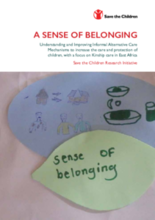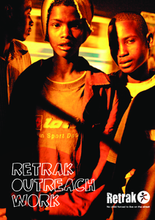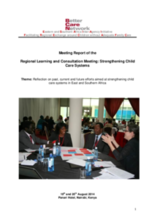childrens_living_arrangement
children_living_without_bio
Displaying 101 - 110 of 157
This interpretive study examines the experiences of 54 Ethiopian emerging adults who had aged out of institutional care facilities. Findings are derived from interviews and focus groups in which questions and activities focused on the challenges faced by participants and the supports they relied on throughout the transition process.
This report presents research conducted by Save the Children in East Africa. The aim of this research was to build knowledge on endogenous care practices within families and communities, especially informal kinship care, in order to increase the care and protection of children. The research on kinship care was implemented in Ethiopia, Kenya, and Zanzibar.
In this article, journalist E.J. Graff, uncovers some of the corruption, fraud, and deception common within the “mini-industry” of U.S. adoptions from Ethiopia, and how that “industry” has come to see better regulation through diplomacy and a new federal law.
27-28 October 2014 at the UN Conference Centre in Addis Ababa, Ethiopia
This article details the introduction of a livelihood project for unaccompanied children in the Dadaab refugee camp in Kenya, which aimed at strengthening the household economy of foster families and improving the care of fostered children.
In this paper, Retrak outlines its approach to conducting outreach work with children living and working on the streets.
This video features a segment of a talk on the effects of care environments on children, hosted by the Christian Alliance for Orphans. The key speakers featured include Dr. Kathryn Whetten & Dr. Charles Nelson, who discuss the Positive Outcomes for Orphans study (POFO) and the Bucharest Early Intervention Project (BEIP), respectively.
Following a consultative mapping, a regional learning meeting took place on 19-20 August 2014 in Nairobi, Kenya. The theme of this meeting was "Reflection on past, current and future efforts aimed at strengthening child care systems in East and Southern Africa."
This piece, written by Aselefech Evans, a woman adopted from Ethiopia when she was five years old, addresses the issue of family preservation and international adoption.
This presentation from Innocenti’s Expert Consultation on Family and Parenting Support describes gender roles in parenting in Ethiopia, the missing role of fathers in parenting, legal/policy provisions of family support, and some work being done to engage fathers.



